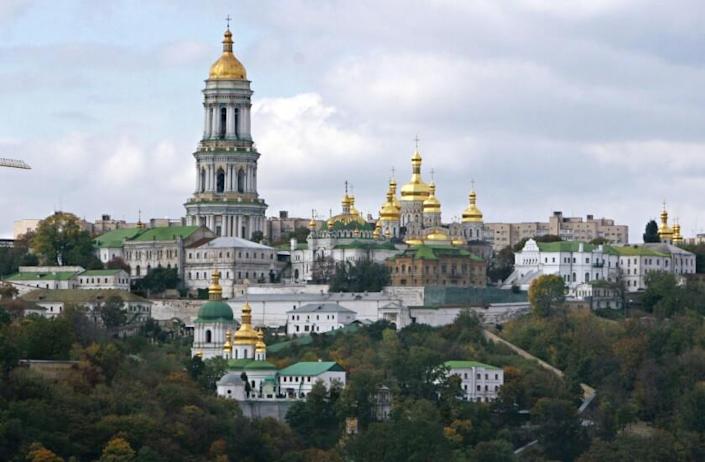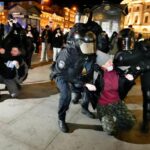
Ukrainians refer to Russian TV and its viewers as “Zombieland,” having long ago developed an immunity to the main talking points of Vladimir Putin’s mindless propaganda war. They know the absurdity of his claims that Kyiv is run by Nazis and drug addicts, NATO is threatening to destroy Russia, and Ukraine’s Russian speakers are victims of a genocide.
Putin has supported these talking points by laying out his own version of Ukrainian history. In his telling, Ukraine only has been independent since 1991 and over the last 30 years has denied its true destiny: unity with Russia in a close-but-subordinate relationship.
But four revolutionary upsurges over the last 100 years in Ukraine refute this narrative: the war of independence in the years 1917–21, the struggle against Stalin’s regime in the 1920s and 1930s, the guerrilla war of the 1940s, and the Euromaidan protests of 2013–14.
Ukraine’s current resistance to the Russian invasion draws on these revolutionary cycles and highlights a long, multigenerational drive for national self-determination in the face of claims by Russian supremacists.
Because of its rich “black earth,” one of the world’s oldest agricultural civilizations, the Trypillian, developed in Ukraine around 5,000 to 3,000 BC. In the 10th to 13th centuries, Kyiv was the center of a powerful state whose ruling family intermarried with European royalty, and in the 17th to 18th centuries, a unique baroque culture flowered there.
The country’s more recent struggle for statehood began near the end of World War I, with the establishment of the Ukrainian People’s Republic. Initially carved from the Russian empire in 1917, the republic joined forces in 1919 with the eastern half of Galicia, which had been part of the Austro-Hungarian empire. The republic was short-lived, however. Bolshevik armies invaded from Russia three times, and the country remained a hotbed of resistance until 1921, with armies and partisans contesting Moscow-imposed rule.
Armed resistance only died down at the end of 1922 with the declaration of a Soviet Ukrainian republic, which promised Ukraine political and cultural autonomy. At that point, some Ukrainian activists committed to the new state- and nation-building process. In 1923, when a policy of Ukrainization was announced, education, media, and government institutions moved toward using Ukrainian as their official language. By 1925, the policy had launched a cultural renaissance in literature and the arts. It produced a plethora of brilliant writers and an internationally recognized avant-garde movement in art, theater and film. This generation, including artists such as Kazimir Malevich, established a new Ukrainian identity as modern, innovative and European.
Stalin cut short this renaissance when he unleashed what amounted to a war on Ukraine. Show trials of Ukrainian activists and cultural figures began in 1928 and a forced collectivization of agricultural production in 1930. In 1932, he curtailed the Ukrainization policy and stifled the intelligentsia. Collectivization sparked thousands of revolts across the country, a resistance that was only crushed by waves of mass arrests and the death of 4 million people during the Great Famine (Holodomor) of 1932–33.
Ten years later, during World War II, an armed underground sprang up in Ukraine to prevent the Soviet authorities from retaking control of the country. The resistance was long and stubborn, and had widespread support in western Ukraine. This part of the country had received its first taste of Soviet rule in 1939–41, which included the destruction of its institutions, the deportation of hundreds of thousands, and numerous atrocities. In the postwar years Soviet authorities killed an estimated 140,000 members of the underground. They also arrested and deported to Siberia as many as 400,000 people, including entire families suspected of aiding the fighters. In 1951, Soviets finally crushed the resistance by tracking down and killing its leadership.
During the Cold War period, much of the world ignored Ukraine’s existence. Western media was content to consider the country part of “Russia,” with no agency or identity of its own. However, in 1991, as soon as the Soviet Union collapsed, Ukrainians again declared independence.
The country’s most recent revolutionary cycle culminated in the 2013-14 Euromaidan protests, often referred to as the Revolution of Dignity. It began in 2004, when Viktor Yanukovich, a Russian sympathizer, tried to come to power. That year, Ukrainian protesters launched the Orange Revolution, a series of strikes, demonstrations and sit-ins that succeeded in dismissing Yanukovich’s fraudulent claim to have won the election.
Backed by Moscow, Yanukovich mounted a powerful media campaign and won the election in 2010. Corruption immediately spread on a massive scale, as did Russia’s influence throughout Ukraine. In 2013, Yanukovich suddenly reversed a policy of moving toward joining the European Union. All Ukraine erupted, but the epicenter of the spontaneous protests was Kyiv’s Independence Square. Special security forces attacked and shot protesters. When the protesters fought back successfully, Yanukovich fled the country. Ukraine once again moved toward establishing its independence and democracy, electing Petro Poroshenko as president in 2014, followed by Volodymyr Zelensky in 2019.
Today, Putin claims that his invasion is required in order to gather Russians, Belarusians and Ukrainians into “one single geopolitical whole,” and solve “Russia’s main problem” — the Ukrainian question. In his mind, the idea of Kyiv as the capital of an independent state symbolizes Russia’s national humiliation. Putin also recognizes that a prosperous, democratic, culturally vibrant Ukraine is a threat to his own rule. But beyond this he sees the crushing of Ukraine as the great opening salvo that will proclaim Russia’s challenge to the West for leadership of a new world order.
The citizens of Ukraine, however, reject Russian supremacy. An entire generation has grown up in an independent state. They know its language, read its literature and identify with its culture. In this time, monuments to Soviet or Russian rule have disappeared, including 17,000 Lenin statues and countless images of Stalin’s acolytes. The remaining symbols of the Soviet past have been refashioned — painted yellow and blue, renamed, and metaphorically repurposed.
In Kyiv, the People’s Friendship Arch, originally built in 1982 as a symbol of Russian-Ukrainian unity, and the massive stainless-steel Motherland Monument, originally erected in 1981 to memorialize World War II soldiers, have both now acquired new meaning: They symbolize Ukrainian resistance to Russian domination.
Zombieland’s spin is facing a potent counter-narrative on the ground as Ukrainians once again reject attempts to erase their history, while they battle for their lives and country. There are echoes in today’s resistance of many past militant struggles, spanning different periods and generations. It is a history of continual and determined striving for national survival.
Myroslav Shkandrij, a professor emeritus of the University of Manitoba in Canada, is the author, most recently, of “Revolutionary Ukraine 1917-2017: Flashpoints in History and Contemporary Memory Wars.” This article was produced in partnership with Zócalo Public Square.
This story originally appeared in Los Angeles Times.




